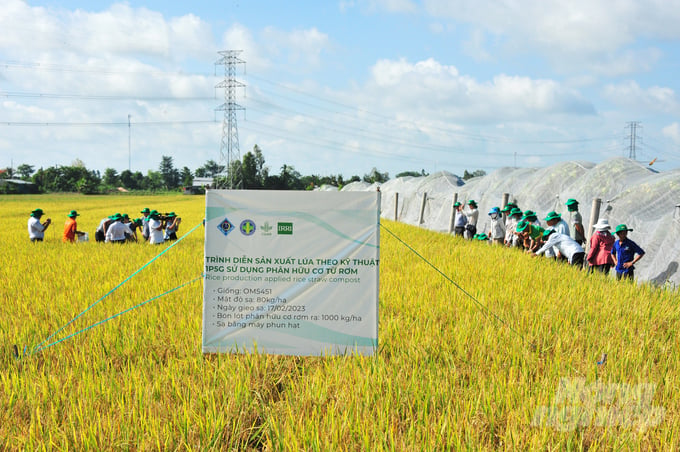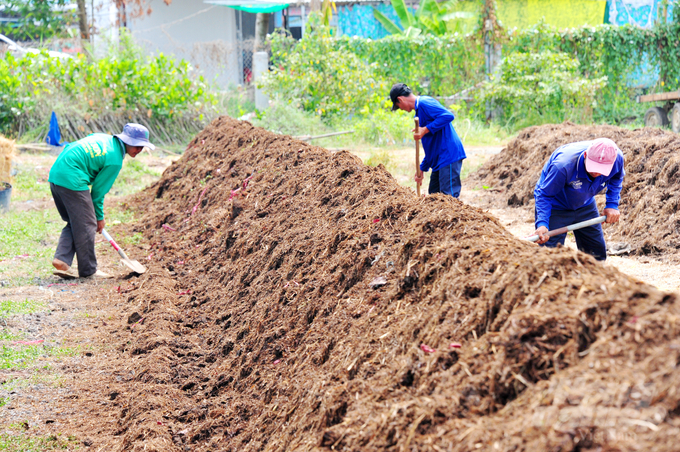November 21, 2025 | 09:18 GMT +7
November 21, 2025 | 09:18 GMT +7
Hotline: 0913.378.918
November 21, 2025 | 09:18 GMT +7
Hotline: 0913.378.918

Rice production model using organic compost made from straw in Thot Not District, Can Tho City. Photo: Le Hoang Vu.
Can Tho City's Sub-Department of Crop Production and Plant Protection recently collaborated with the International Rice Research Institute (IRRI) to organize a workshop on the "Rice production model using organic compost made from straw."
The model was implemented in the late summer-autumn crop of 2023 at the household belonging to Mr. Tran Van Dao in Tan Hung Ward, Thot Not District, Can Tho City on an area of 1.7 hectares. Accordingly, 1 hectare was designated for the utilization of organic compost made from straw. On the other hand, the remaining area of approximately 7 sao served as a control plot produced using traditional methods, which utilize 100% chemical fertilizers and pesticides sponsored by the Dam Phu My Fertilizer Company.
Mr. Tran Van Dao explained that the model's rice fields used organic production methods for this year's summer-autumn rice crop. Namely, he used 1 ton of straw compost per hectare, which was divided into multiple applications during the crop's growth. Additionally, a small amount of NPK fertilizer from Dam Phu My Fertilizer Company was incorporated to ensure sufficient nutrients for the growth of rice plants.
For the aforementioned crop, Mr. Dao planted OM5451 rice variety with a seeding rate of 80 kilogram per hectare. The organice rice production area in his family's field has achieved a fresh rice yield of 6.4 tons per hectare, which is 0.3 tons per hectare higher than the control field.
According to Ms. Pham Thi Minh Hieu, General Director of Can Tho City's Sub-Department of Crop Production and Plant Protection, the organic compost made from straw, which was applied at a rate of 1 ton per hectare, has helped develop an extensive and deep root system compared to fields without organic compost. This enhanced root system makes the rice plants sturdier, less prone to lodging, and reduces post-harvest losses.

Farmers are being guided through the technical process of handling and converting straw into organic compost at the model farm. Photo: Le Hoang Vu.
The rice production model utilize certified and higher-quality seeds, which are sown at a sparse density of 80 kilograms per hectare, and receive an initial application of organic fertilizer. This approach helps reduce the amount of nitrogen fertilizer used, limits the risk of pest and disease outbreaks, and subsequently decreasing the requirement for pesticides. This leads to cost savings in production, increased productivity, higher profits, and improved rice grain quality.
According to Ms. Pham Thi Minh Hieu, the city's agricultural sector is currently implementing multiple pilot rice production models using organic compost made from straw in conjunction with the "1 must, 5 reductions" technique. These models are being deployed in the districts of Thoi Lai, Co Do, and Thot Not with each model covering 1 hectare of production area. Additionally, the models have successfully completed two rice crops with a total of 6 models implemented in the 2023 winter-spring and summer-autumn crops.

The model that utilizes organic compost made from straw has achieved a fresh rice yield of 6.4 tons per hectare, which is 0.3 tons per hectare higher than the control field. This higher yield has resulted in a profit of over 30 million VND per hectare.
Based on assessment results, this production model helps farmers reduce their expenses on fertilizers and chemical pesticides by 35 - 40% while increasing profits by an additional 10% per unit area compared to traditional production methods.
"The organic production approach with organic compost made from straw has significantly reduced production costs for farmers. The agricultural sector in Can Tho recommends further popularizing and replicating this model in the near future," said Ms. Pham Thi Minh Hieu.
Ms. Dinh Thi Kim Dung, Head of the Office of the International Rice Research Institute in Vietnam, stated that the IRRI has collaborated with Can Tho city's Sub-Department of Crop Production and Plant Protection since 2022 to provide training for local farmers on utilizing and converting straw into organic compost for rice.
Upon returning to the city, the news reporters observed that farmers using organic compost made from straw compost have harvested healthy rice crops with fewer pests, and the yields have significantly increased. Evidently, this is a sustainable and environmentally friendly agricultural production model that reduces greenhouse gas emissions, and adapts to climate change in addition to minimizing production costs, producing safe and high-quality products.
Translated by Nguyen Hai Long

(VAN) This is the study conducted by IRRI and Can Tho University on the rice straw value chain in Mekong Delta showing an economic potential of more than 6.6 trillion VND/year.

(VAN) By participating in cooperative economics, many farmers in Tay Ninh have overcome hardship, mastered clean dragon fruit cultivation techniques.

(VAN) The crossbreeding program in the former Binh Dinh province (now part of Gia Lai) has shown signs of decline, and urgent measures are needed to revive it and sustain past achievements.

(VAN) The agricultural sector agreed on a roadmap to pilot the MRV protocol and expand low-emission rice production from the 2025-2026 winter-spring crop.

(VAN) Agricultural extension officers in Quang Ninh do more than transmit knowledge; they have become a steadfast support system for farmers on the path to sustainable agricultural development.

(VAN) The development of a high-quality beef cattle herd has brought major benefits to livestock farmers, creating jobs and enabling better use of agricultural by-products.

(VAN) In the eastern region of Gia Lai, crossbred cattle now account for 93%, forming a high-quality beef herd and establishing a recognized brand, the result of 35 years of persistent effort.